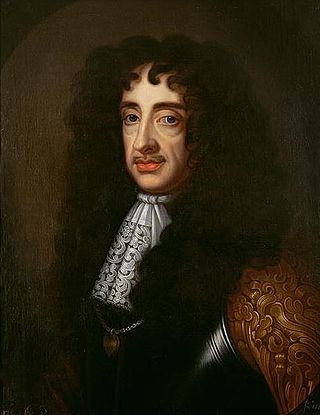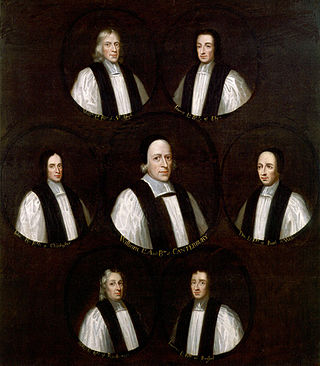The Declaration of Indulgence was Charles II of England's attempt to extend religious liberty to Protestant nonconformists and Roman Catholics in his realms, by suspending the execution of the Penal Laws that punished recusants from the Church of England. Charles issued the Declaration on 15 March 1672.
It was highly controversial and Sir Orlando Bridgeman, son of a bishop, resigned as Lord Keeper of the Great Seal, because he refused to apply the Great Seal to it, regarding it as too generous to Catholics.
In 1673 the Cavalier Parliament compelled Charles to withdraw the declaration and implement, in its place, the first of the Test Acts (1673), which required anyone entering public service in England to deny the Catholic doctrine of transubstantiation and to take Anglican communion. [1] When Charles II's openly Catholic successor James II attempted to issue a similar Declaration of Indulgence, an order for general religious tolerance, it became one of the grievances that led to the Glorious Revolution which ousted him from the throne.

Charles II was King of Scotland from 1649 until 1651, and King of England, Scotland and Ireland from the 1660 Restoration of the monarchy until his death in 1685.

The Conventicle Act 1664 was an Act of the Parliament of England that forbade conventicles, defined as religious assemblies of more than five people other than an immediate family, outside the auspices of the Church of England and the rubrics of the 1662 Book of Common Prayer.

The Test Acts were a series of English penal laws that served as a religious test for public office and imposed various civil disabilities on Roman Catholics and nonconformists. The underlying principle was that only people taking communion in the established Church of England were eligible for public employment, and the severe penalties pronounced against recusants, whether Catholic or nonconformist, were affirmations of this principle. Similar laws were introduced in Scotland with respect to the Presbyterian Church of Scotland. In practice nonconformists were often exempted from some of these laws through the regular passage of Acts of Indemnity: in particular, the Indemnity Act 1727 relieved Nonconformists from the requirements in the Test Act 1673 and the Corporation Act 1661 that public office holders must have taken the sacrament of the Lord's Supper in an Anglican church. Except at Oxbridge, where nonconformists and Catholics could not matriculate (Oxford) or graduate (Cambridge) until 1871, they were seldom enforced after 1800 and the Tory government repealed them in 1828 with little controversy.
The Declaration of Breda was a proclamation by Charles II of England in which he promised a general pardon for crimes committed during the English Civil War and the Interregnum for all those who recognized Charles as the lawful king; the retention by the current owners of property purchased during the same period; religious toleration; and the payment of arrears to members of the army, and that the army would be recommissioned into service under the crown. Further, regarding the two latter points, the parliament was given the authority to judge property disputes and responsibility for the payment of the army. The first three pledges were all subject to amendment by acts of parliament.

The Treaty of Dover, also known as the Secret Treaty of Dover, was a treaty between England and France signed at Dover on 1 June 1670. It required that Charles II of England would convert to the Roman Catholic Church at some future date and that he would assist Louis XIV with 60 warships and 4,000 soldiers to help in France's war of conquest against the Dutch Republic. In exchange, Charles would secretly receive a yearly pension of £230,000, as well as an extra sum of money when Charles informed the English people of his conversion, and France would send 6,000 French troops if there was ever a rebellion against Charles in England. The secret treaty was signed by Arlington, Arundell, Clifford, and Bellings for England and Colbert de Croissy for France. The two kings exchanged letters of ratification and kept secret the existence of the treaty. A public treaty of Dover was also negotiated, but it was a screen designed for propaganda purposes and to hide the religious dimension of the secret treaty. The Third Anglo-Dutch War was a direct consequence of this treaty. The actual treaty was published by historians a century later.

The Cavalier Parliament of England lasted from 8 May 1661 until 24 January 1679. It was the longest English Parliament, and longer than any Great British or UK Parliament to date, enduring for nearly 18 years of the quarter-century reign of Charles II of England. Like its predecessor, the Convention Parliament, it was overwhelmingly Royalist and is also known as the Pensioner Parliament for the many pensions it granted to adherents of the King.
A jubilee is a special year of remission of sins and universal pardon. In Leviticus, a jubilee year is mentioned to occur every 50th year; during which slaves and prisoners would be freed, debts would be forgiven and the mercies of God would be particularly manifest.

Anthony Ashley Cooper, 1st Earl of Shaftesbury PC FRS, 22 July 1621 to 21 January 1683, was an English politician and statesman from Dorset. He held senior political office under both the Commonwealth of England and Charles II, serving as Chancellor of the Exchequer from 1661 to 1672, and Lord Chancellor from 1672 to 1673. During the 1679 to 1681 Exclusion Crisis, he headed the movement to bar the Catholic heir, James II from the succession, often seen as the origin of the Whig party. He was also a patron of the political philosopher John Locke, with whom he collaborated with in writing the Fundamental Constitutions of Carolina in 1669.

Thomas Osborne, 1st Duke of Leeds,, was a prominent English politician. Under King Charles II, he was the leading figure in the government for around five years in the mid-1670s. He fell out of favour due to corruption and other scandals, and was impeached and eventually imprisoned in the Tower of London for five years until the accession of James II of England in 1685. In 1688 he was one of the Immortal Seven group that invited William III, Prince of Orange to depose James II as monarch during the Glorious Revolution. He was again the leading figure in government, known at the time as the Marquess of Carmarthen, for a few years in the early 1690s.
The Declaration of Indulgence, also called Declaration for Liberty of Conscience, was a pair of proclamations made by James II of England and Ireland and VII of Scotland in 1687. The Indulgence was first issued for Scotland on 12 February and then for England on 4 April 1687. An early step towards establishing freedom of religion in the British Isles, it was cut short by the Glorious Revolution.
Henry Arundell, 3rd Baron Arundell of Wardour, PC was a Peer of England during the 17th century, and the most famous of the Lords Arundell of Wardour. He served as Lord Privy Seal and Lord High Steward, and was appointed to the Privy Council. During the Popish Plot he suffered a long period of imprisonment, although he was never brought to trial.

The Seven Bishops were members of the Church of England tried and acquitted for seditious libel in June 1688, an act viewed as a significant element in the events that led to the November 1688 Glorious Revolution and deposition of James II.

Sir Jonathan Trelawny, 3rd Baronet was an English Bishop of Bristol, Bishop of Exeter and Bishop of Winchester. Trelawny is best known for his role in the events leading up to the Glorious Revolution which are sometimes believed to be referenced in the Cornish anthem "The Song of the Western Men".

Robert Frampton was Bishop of Gloucester in England from 1681 to 1691 and later a Non-juror.

James VII and II was King of England and King of Ireland as James II, and King of Scotland as James VII from the death of his elder brother, Charles II, on 6 February 1685. He was deposed in the Glorious Revolution of 1688. He was the last Catholic monarch of England, Scotland, and Ireland. His reign is now remembered primarily for conflicts over religious tolerance, but it also involved struggles over the principles of absolutism and the divine right of kings. His deposition ended a century of political and civil strife in England by confirming the primacy of the English Parliament over the Crown.
Richard Perrinchief or Perrincheif was an English royalist churchman, a biographer of Charles I, writer against religious tolerance, and archdeacon of Huntingdon.

From 1649 to 1660, Puritans in the Commonwealth of England were allied to the state power held by the military regime, headed by Lord Protector Oliver Cromwell until he died in 1658. They broke into numerous sects, of which the Presbyterian group comprised most of the clergy, but was deficient in political power since Cromwell's sympathies were with the Independents. During this period, the term "Puritan" becomes largely moot, therefore, in British terms, though the situation in New England was very different. After the English Restoration, the Savoy Conference and Uniformity Act 1662 and Great Ejection drove most of the Puritan ministers from the Church of England, and the outlines of the Puritan movement changed over a few decades into the collections of Presbyterian and Congregational churches, operating as they could as Dissenters under changing regimes.

The Toleration Act 1688, also referred to as the Act of Toleration, was an Act of the Parliament of England. Passed in the aftermath of the Glorious Revolution, it received royal assent on 24 May 1689.
Of True Religion, Heresy, Schism, Toleration; and what best means may be used against the Growth of Popery is the title of a polemical tract against the popery of the Roman Catholic Church written by John Milton which was published in London in 1673. The tract addresses Milton's own problems with the doctrines, practices, and ceremonies associated with the pope or the papal system of the Roman Catholic Church and, with what Milton called, the implicit faith of its members. The anti-Catholic ideas in Milton's writing are in direct response to the tolerant stance of King Charles II of England toward the Roman Catholic Church. Pro-Catholic sentiments had not been popular in England since the very bloody reign of the devout Roman Catholic queen Mary I of England. The obvious anti-Catholic ideas present in Milton's writing, coupled with Milton's own influence, may have inspired such social movements as the Glorious Revolution of 1688 and the eventual passing of the Popery Act of 1698.
Francis Hawkins was an Anglican priest at the time of the Glorious Revolution.